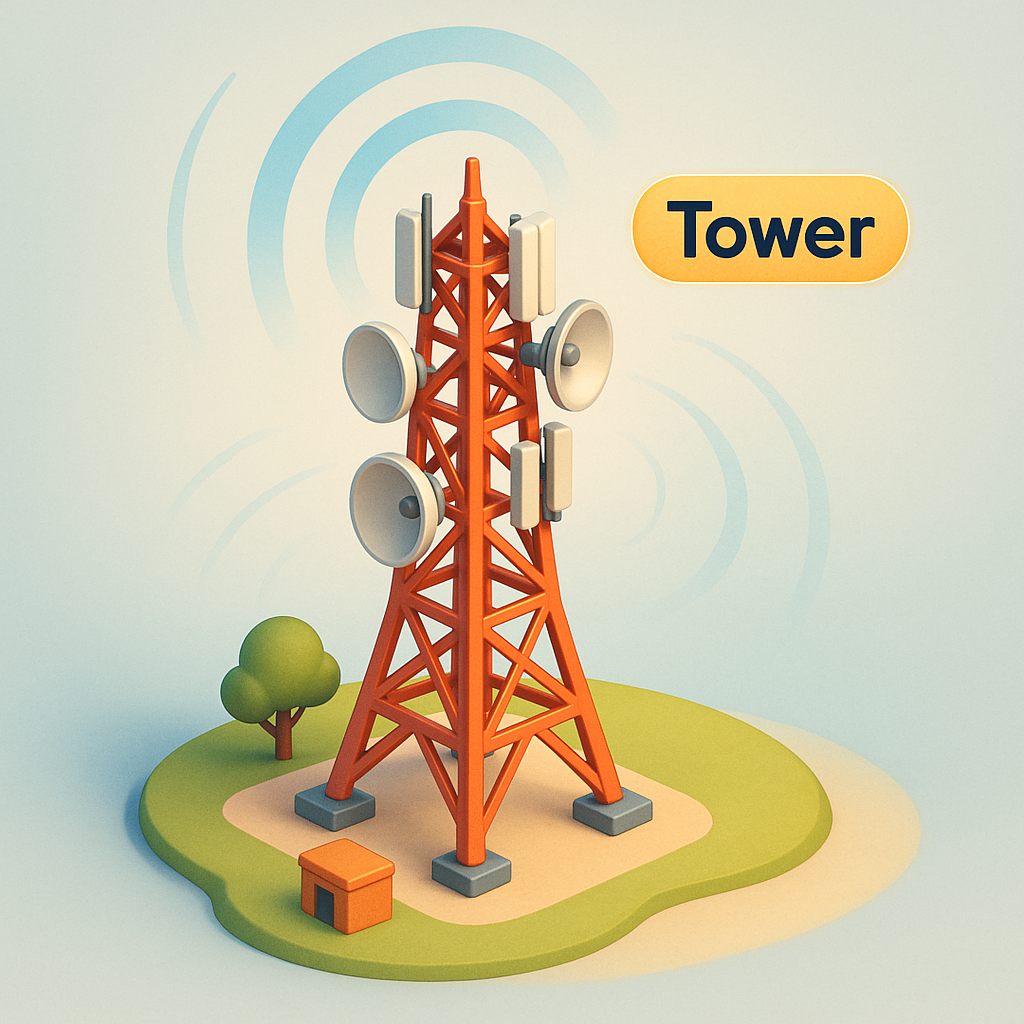Tower
Definition
Tower refers to a tall, narrow structure that rises significantly above its surroundings, often used for observation, defense, or support. As a verb, it means to rise high above something.
Parts of Speech
- Noun
- Verb
Pronunciation
American English
- IPA Pronunciation: /ˈtaʊ.ɚ/
- Respelling: TOW-er
British English
- IPA Pronunciation: /ˈtaʊ.ə/
- Respelling: TOW-uh
Etymology
The word "tower" originates from Old English "tor" or "torr," meaning "a high structure or hill," derived from Latin "turris" and Greek "τύρρις" (turris), both meaning "tower." Its usage in English became common in the Middle Ages to describe tall structures for defense or observation.
Derivatives
- Towering (adjective/verb)
- Towerless (adjective)
- Towerlike (adjective)
- Retower (verb)
- Tower block (noun, British English)
Synonyms
- Spire
- Pillar
- Skyscraper
Antonyms
- Valley
- Ground
- Lowland
Usage
The noun "tower" is used to describe tall structures, such as "The Eiffel Tower is a famous landmark." As a verb, it describes something that rises high, such as "The mountain towers over the valley."
Related Terms
- Fortress: A large fortified building or structure.
- Turret: A small tower, often on a castle or fortress.
- Observation deck: A platform at a high point for viewing.
Detailed Definitions
Noun
- A tall structure, often for observation or defense: Refers to buildings or constructions that rise above their surroundings.
- Example: "The watchtower was used to spot approaching ships."
- A structure for support or function: Describes tall structures like radio towers or water towers.
- Example: "The communication tower provides cellular service to the area."
Verb
- To rise high above something: Refers to standing or appearing much taller than surrounding elements.
- Example: "The skyscraper towers over the city."
- To dominate or surpass in height or importance: Describes a metaphorical or literal act of overshadowing.
- Example: "Her achievements tower over those of her peers."
tower



🇨🇳 Mandarin
- 塔 (tǎ): tower
- IPA Pronunciation: /tʰa˨˩˦/
- Respelling in English: ta
- 楼 (lóu): building, tower
- IPA Pronunciation: /loʊ̯˧˥/
- Respelling in English: low
🇮🇳 Hindi
- मीनार (minar): minaret, tower
- IPA Pronunciation: /miːnaːr/
- Respelling in English: mee-nar
- टावर (tavar): tower
- IPA Pronunciation: /ʈaːʋər/
- Respelling in English: ta-var
🇪🇸 Spanish
- Torre (torre): tower
- IPA Pronunciation: /ˈto̞re̞/
- Respelling in English: toh-re
- Atalaya (atalaya): watchtower, tower
- IPA Pronunciation: /ataˈlaʝa/
- Respelling in English: a-ta-la-ya
🇫🇷 French
- Tour (tour): tower
- IPA Pronunciation: /tuʁ/
- Respelling in English: tour
- Donjon (donjon): keep, tower
- IPA Pronunciation: /dɔ̃ʒɔ̃/
- Respelling in English: don-jon
🇦🇪 Modern Standard Arabic
- برج (burj): tower
- IPA Pronunciation: /burd͡ʒ/
- Respelling in English: burj
- مئذنة (mi'thana): minaret, tower
- IPA Pronunciation: /miʔθænæ/
- Respelling in English: mi-than-a
🇧🇩 Bengali
- টাওয়ার (ţā'oyāra): tower
- IPA Pronunciation: /ʈao̯war/
- Respelling in English: ta-war
- মিনার (mināra): minaret, tower
- IPA Pronunciation: /minaːr/
- Respelling in English: minar
🇷🇺 Russian
- Башня (bashnya): tower
- IPA Pronunciation: /ˈbaʂnʲə/
- Respelling in English: bash-nya
- Турец (turets): turret, tower
- IPA Pronunciation: /ˈturʲɪts/
- Respelling in English: tu-rits
🇵🇹 Portuguese
- Torre (torre): tower
- IPA Pronunciation: /ˈtoʁi/
- Respelling in English: toh-ri
- Mirante (mirante): lookout, tower
- IPA Pronunciation: /miˈɾɐ̃tʃi/
- Respelling in English: mi-ran-te
🇮🇩 Indonesian
- Menara (menara): tower
- IPA Pronunciation: /mənara/
- Respelling in English: me-na-ra
- Puncak (puncak): peak, tower
- IPA Pronunciation: /punt͡ʃaʔ/
- Respelling in English: pun-chak
🇩🇪 German
- Turm (Turm): tower
- IPA Pronunciation: /tuʁm/
- Respelling in English: turm
- Zinnen (zinnen): battlements, tower
- IPA Pronunciation: /ˈtsɪnən/
- Respelling in English: zin-nen
🇯🇵 Japanese
- タワー (tawā): tower
- IPA Pronunciation: /ta̠ɰᵝa̠ː/
- Respelling in English: ta-waa
- 塔 (tou): pagoda, tower
- IPA Pronunciation: /to̞ː/
- Respelling in English: toh
🇻🇳 Vietnamese
- Tháp (tháp): tower, pagoda
- IPA Pronunciation: /tʰaːp˧ˀ˨ʔ/
- Respelling in English: thap
- Toà tháp (toà tháp): tower
- IPA Pronunciation: /twaː˨˩ tʰaːp˧ˀ˨ʔ/
- Respelling in English: toa thap
🇰🇷 Korean
- 탑 (tap): pagoda, tower
- IPA Pronunciation: /tʰap̚/
- Respelling in English: tap
- 타워 (tawo): tower
- IPA Pronunciation: /tʰawʌ/
- Respelling in English: ta-wo
🇹🇷 Turkish
- Kule (kule): tower
- IPA Pronunciation: /kuːle/
- Respelling in English: koo-le
- Minare (minare): minaret, tower
- IPA Pronunciation: /miˈnaːɾe/
- Respelling in English: mina-re
🇵🇰 Urdu
- ٹاور (tower): tower
- IPA Pronunciation: /ʈaːʋər/
- Respelling in English: ta-var
- مینار (minar): minaret, tower
- IPA Pronunciation: /miːnaːr/
- Respelling in English: minar





